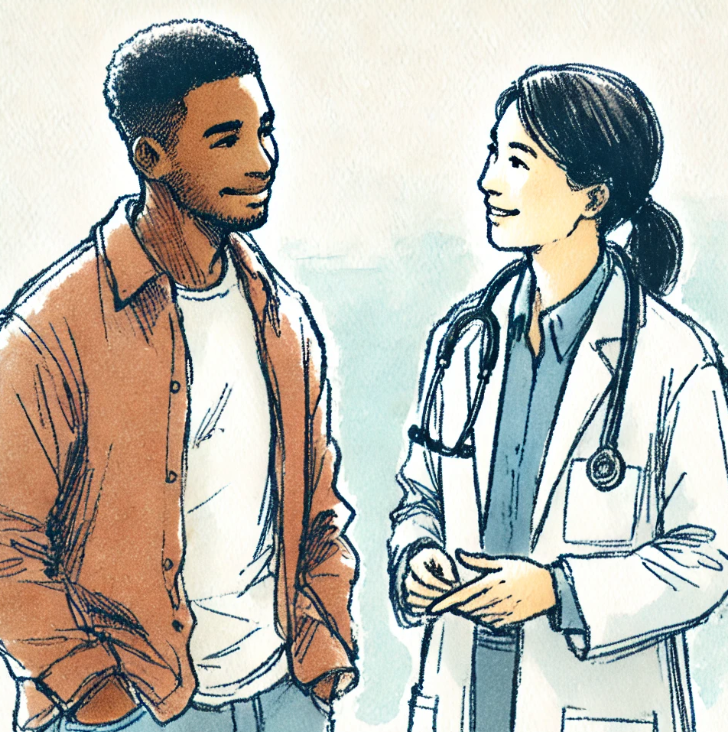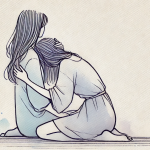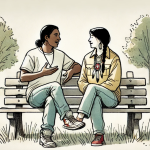
The Hidden Health Toll of Being Bisexual: What You Need to Know
Have you ever thought about how feeling disrespected could affect your health? For many bisexual individuals, the answer is more complex than you might imagine. According to recent research, the everyday stress of not being treated with the same respect as others could influence not just their mental health, but their physical health as well. From trouble sleeping to elevated blood pressure, the effects of discrimination go deeper than most people realize.
This study sheds light on the often-overlooked health struggles of bisexual individuals, particularly those without health insurance. The findings highlight the significant toll that both disrespect and socioeconomic challenges can take on this community’s well-being.
How Social Stress Affects Physical Health
You may wonder, “How can social stressors like disrespect affect someone’s physical health?” The answer lies in the body’s response to stress. For bisexual individuals, chronic stress—especially stress stemming from discrimination and stigma—can cause systemic inflammation. One marker of this inflammation is a substance called C-reactive protein (CRP). When CRP levels rise, it signals the presence of inflammation in the body, which can contribute to serious health problems like high blood pressure and heart disease.
The study found that bisexual participants without health insurance often had elevated CRP levels, suggesting that discrimination and the lack of healthcare access are contributing to their physical decline. When left unchecked, this inflammation may escalate to more serious cardiovascular issues over time.
The Sleep Connection: How Stress Disrupts Rest
Sleep is another key factor in this story. Sleep problems, such as difficulty falling asleep or staying asleep, were highly correlated with feelings of disrespect among bisexual individuals in this study. Think about the last time you couldn’t sleep because of stress—now imagine feeling that way constantly because of how others treat you.
When bisexual individuals feel they are treated with less respect or courtesy than others, it can lead to psychological stress, which in turn disrupts their sleep patterns. This is crucial because good sleep is essential for overall health, especially for the body’s ability to repair itself. Chronic sleep deprivation weakens the immune system and increases vulnerability to illnesses, further contributing to the health challenges faced by bisexual people.
Why Bisexuality Carries a Unique Burden
You might ask, “Why do bisexual people face unique health challenges compared to other sexual minorities?” The answer lies in the concept of “bisexual minority stress,” a term used to describe the chronic stress that bisexual people endure due to both external and internalized stigma. Unlike their lesbian or gay peers, bisexual individuals often find themselves marginalized not only by heterosexual society but also within the LGBTQ+ community. They are frequently perceived as “not queer enough” when in opposite-sex relationships and “too queer” when in same-sex relationships.
This constant balancing act creates a unique form of stress. They often experience “biphobia”—discrimination against bisexual individuals—and are less likely to have strong social support systems. Without that buffer, the impact of discrimination can hit harder, leaving many bisexual individuals struggling to cope.
How Income and Health Insurance Play a Role
While disrespect and stigma certainly have a heavy influence, income level and access to health insurance are equally important factors in the well-being of bisexual individuals. The study found a strong connection between lower income and poorer health outcomes. Participants with lower household incomes were more likely to feel disrespected, and this sense of being undervalued trickled down into their health.
Health insurance plays a critical role in this equation. Those without insurance had higher CRP levels, indicating that they are at higher risk for health issues. Without access to preventative care or affordable treatment, their bodies are more vulnerable to the long-term effects of stress and inflammation.
Mental Health Matters Too
It’s not just physical health that’s affected. Depression is a major concern for bisexual individuals, and it was frequently linked to both sleep problems and feelings of disrespect. The psychological stress from discrimination can worsen mental health, creating a vicious cycle. When someone is depressed, their ability to cope with stress decreases, which in turn exacerbates both their mental and physical health issues.
Addressing the mental health needs of bisexual individuals is just as important as tackling their physical health problems. However, without health insurance, many are unable to access the mental health support they need. This study emphasizes the importance of providing accessible, affordable healthcare that includes mental health services for bisexual people.
Why This Matters for You
The real-world implications of this research are clear. Bisexual individuals are often invisible in health discussions, yet they experience unique stressors that significantly affect their well-being. By understanding the connections between social stressors like disrespect, lack of health insurance, and chronic health problems, we can begin to make meaningful changes in healthcare policies and community support systems.
For healthcare providers, this research suggests the need for more inclusive healthcare practices that recognize the specific challenges faced by bisexual individuals. Offering targeted interventions, such as stress-reduction programs, accessible mental health services, and better sleep hygiene education, could make a world of difference.
What Can Be Done?
So, how can we use this knowledge to help? First, it’s crucial to advocate for universal health care that ensures all individuals, regardless of sexual orientation or income level, have access to necessary healthcare services. Access to healthcare can be a lifesaver, not just for physical health but also for mental health, as timely interventions can prevent the compounding of stress-related issues.
Second, communities must work toward reducing discrimination. Whether it’s in workplaces, schools, or healthcare settings, treating everyone with respect is vital to ensuring everyone has the opportunity to lead a healthy life. Implementing policies that actively fight discrimination will improve not only the mental and emotional health of bisexual individuals but also their physical health.
Conclusion: We All Play a Role in Health Equity
The findings of this study serve as a reminder that health inequities are real and multifaceted. For bisexual individuals, the combination of social stress, lack of health insurance, and economic barriers can create a perfect storm that leads to significant health challenges. But by raising awareness and advocating for systemic changes, we can work toward a future where everyone—regardless of their sexual orientation—has equal access to health and wellness.
What do you think?
- How can we create more supportive environments for bisexual individuals both inside and outside of the healthcare system?
- What steps can communities take to reduce the chronic stress experienced by sexual minorities?




